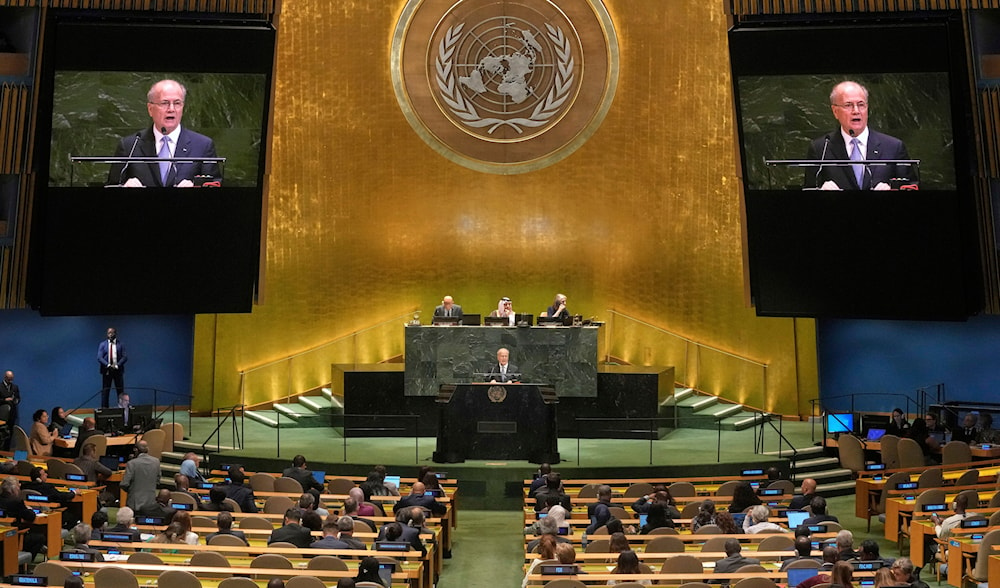US to deny visas to PA officials ahead of UN summit on statehood
The US says it will refuse visas to Palestinian Authority officials ahead of the 2025 UN General Assembly, where France and other nations push for Palestinian state recognition.
-

Palestine Prime Minister Mohammed Mustafa addresses the United Nations General Assembly, Monday, July 28, 2025 (AP)
The United States announced Friday it will deny visas to members of the Palestinian Authority ahead of next month’s United Nations General Assembly, where France and several other nations are preparing to push for the recognition of a Palestinian state.
The move underscores President Donald Trump’s close alignment with the Israeli government, which has long opposed Palestinian statehood.
“Secretary of State Marco Rubio is denying and revoking visas from members of the Palestine Liberation Organization (PLO) and the Palestinian Authority (PA) ahead of the upcoming United Nations General Assembly,” the State Department said in a statement.
According to the statement, the decision reflects Washington’s intent to hold the PLO and PA “accountable for failing to meet their commitments” and for “undermining the prospects for peace.” The Trump administration further accused Palestinian officials of engaging in “lawfare” by appealing to the International Criminal Court and the International Court of Justice to pursue cases against "Israel".
“The Palestinian Authority must end attempts to bypass negotiations through international lawfare campaigns and stop efforts to secure the unilateral recognition of a conjectural Palestinian state,” it added.
Abbas may be barred from attending
It remains unclear if the visa restrictions apply to all Palestinian officials. Palestinian President Mahmoud Abbas had been scheduled to attend the UN session, Palestinian Ambassador Riyadh Mansour told reporters in New York.
“We will see exactly what it means and how it applies to any of our delegation, and we will respond accordingly,” Mansour said regarding the State Department’s decision.
Later, the Palestinian Authority called on the United States to reverse its denial of visas.
In a statement published by the official news agency WAFA, it said the Palestinian presidency "called on the US administration to reconsider and reverse its decision."
The move "stands in clear contradiction to international law and the UN Headquarters Agreement," it said.
When asked for clarification on the restrictions, the State Department referred back to its original statement. Spokesperson Tommy Pigott added that the US “remains open to re-engagement should the PA/PLO demonstrably take concrete steps to return to constructive engagement,” stressing that the Trump administration “does not reward terrorism.”
Both the US and "Israel" have accused France and other nations of “rewarding Hamas” through their pledges to recognize Palestinian statehood.
Breaking diplomatic norms
As the host nation to the UN headquarters in New York, the US is generally obliged to grant visas to all foreign officials attending UN meetings. The State Department, however, defended its move, arguing that the Palestinian UN mission remains functional and therefore Washington is not violating its obligations.
It is not the first time a US administration has barred Palestinian officials from attending UN conferences, as back in 1988, the UN General Assembly was forced to move its session to Geneva after Washington refused entry to PLO leader Yasser Arafat.
France pushes recognition, other Western nations follow
French President Emmanuel Macron, frustrated by nearly two years of continuous Israeli military operations in Gaza, has insisted that the "peace process" cannot be delayed further. He has called a special summit on September 22, a day before the UN General Assembly opens, where he will announce France’s formal recognition of Palestine.
Since Macron’s declaration, Canada and Australia have also confirmed plans to recognize a Palestinian state. Britain has said it will follow suit unless "Israel" agrees to a Gaza ceasefire and halts further annexation of the West Bank.
Currently, 147 of the UN’s 193 member states recognize Palestine as a sovereign state. The September summit could bring recognition from several Western powers, effectively ending decades of Palestinian diplomatic isolation.
Trump’s approach to the UN
Trump is expected to personally attend the upcoming General Assembly and deliver one of its opening speeches. However, his administration has consistently reduced US engagement with multilateral institutions.
In recent years, Trump has moved to withdraw the US from the World Health Organization and the UN climate accord, while imposing sanctions on judges of the International Criminal Court involved in cases against "Israel" or the US.
'Turning point' for the Palestinian cause
UN Secretary-General Antonio Guterres described the September session as a potential “turning point” for advancing the "two-state solution" and achieving “irreversible progress towards ending the occupation."
If France and the UK proceed with recognition, the US will stand alone among the permanent Security Council members in rejecting Palestinian statehood. For Palestinian leaders, the recognition wave offers what Prime Minister Mohammed Mustafa described as a reaffirmation of the “inalienable right of the Palestinian people to self-determination.”

 5 Min Read
5 Min Read










